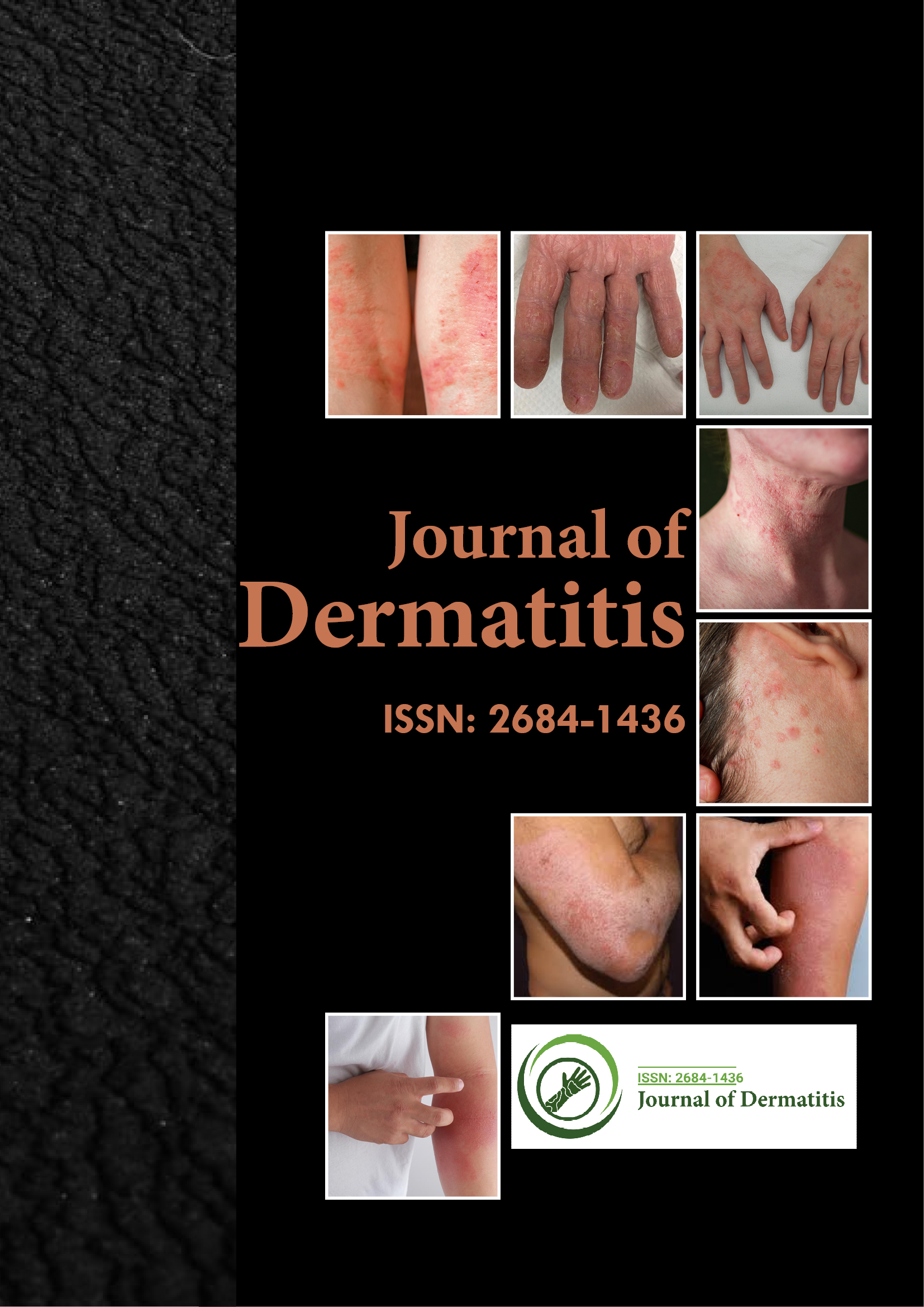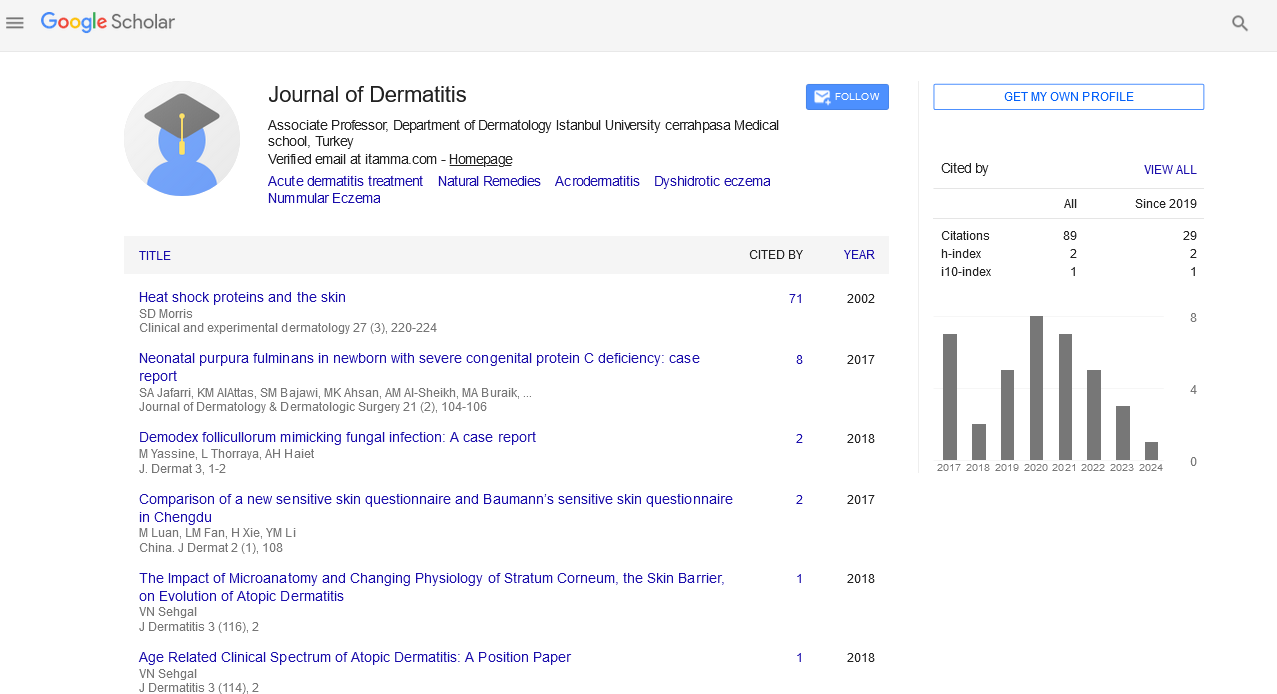Indexed In
- RefSeek
- Hamdard University
- EBSCO A-Z
- Euro Pub
- Google Scholar
Useful Links
Share This Page
Journal Flyer

Open Access Journals
- Agri and Aquaculture
- Biochemistry
- Bioinformatics & Systems Biology
- Business & Management
- Chemistry
- Clinical Sciences
- Engineering
- Food & Nutrition
- General Science
- Genetics & Molecular Biology
- Immunology & Microbiology
- Medical Sciences
- Neuroscience & Psychology
- Nursing & Health Care
- Pharmaceutical Sciences
Commentary - (2023) Volume 8, Issue 3
Causes, Manifestations, Medical Therapy, and Mitigation of Acrodermatitis
Katarina Wormser*Received: 29-Mar-2023, Manuscript No. JOD-23-21108; Editor assigned: 31-Mar-2023, Pre QC No. JOD-23-21108 (PQ); Reviewed: 21-Apr-2023, QC No. JOD-23-21108; Revised: 28-Apr-2023, Manuscript No. JOD-23-21108 (R); Published: 05-May-2023, DOI: 10.35248/2684-1436.23.8.193
Description
Acrodermatitis, also known as acrodermatitis enteropathica, is a rare genetic disorder that affects the skin, hair, and nails. It is caused by a deficiency of zinc, an essential mineral required for the proper functioning of the immune system, wound healing, and cellular growth and differentiation. In this article, we will discuss the causes, symptoms, and treatment of acrodermatitis.
Causes of acrodermatitis
Acrodermatitis is caused by a mutation in the gene, which codes for a protein called zinc transporter. This protein is responsible for transporting zinc into cells, where it is needed for various cellular processes. A mutation in this gene results in a deficiency of zinc in the body, leading to the symptoms of acrodermatitis.
The condition can also be acquired through other factors such as malnutrition, alcoholism, and chronic liver and renal diseases. Individuals with anorexia nervosa or other eating disorders may also develop acrodermatitis due to insufficient zinc intake.
Symptoms of acrodermatitis
The symptoms of acrodermatitis typically appear in infancy or early childhood. The most common symptom is a rash that appears around the mouth, anus, and other skin folds. The rash may be itchy, red, and scaly, and can sometimes become infected. Other symptoms of acrodermatitis include hair loss, nail abnormalities, diarrhea, and weight loss. Children with acrodermatitis may also have delayed growth and development due to the effects of zinc deficiency on the immune system and other cellular processes.
Treatment of acrodermatitis
The treatment of acrodermatitis involves correcting the zinc deficiency in the body. This can be achieved through oral or intravenous supplementation of zinc. The dosage and duration of treatment depend on the severity of the deficiency and the response of the patient to treatment. In cases of acquired acrodermatitis, the underlying cause of the deficiency must also be addressed. This may involve dietary changes, nutritional counseling, and treatment of any underlying medical conditions. Patients with acrodermatitis may also require treatment for any secondary infections or complications that arise due to the skin lesions. This may involve the use of topical or systemic antibiotics, anti-inflammatory drugs, or other medications as deemed necessary by a healthcare professional.
Prevention of acrodermatitis
Acrodermatitis is a rare genetic disorder that cannot be prevented. However, individuals can reduce their risk of developing the condition by maintaining a healthy and balanced diet rich in zinc-containing foods such as meat, fish, poultry, beans, and nuts. Individuals with chronic medical conditions or those who have undergone bariatric surgery may require zinc supplementation to maintain adequate levels of the mineral in the body. It is important to consult with a healthcare professional before starting any supplements to avoid potential interactions with other medications or health conditions.
Acrodermatitis is a rare genetic disorder that can also be acquired through other factors such as malnutrition, alcoholism, and chronic liver and renal diseases. The condition is caused by a deficiency of zinc, an essential mineral required for various cellular processes. The symptoms of acrodermatitis include a rash, hair loss, nail abnormalities, diarrhea, and weight loss. The treatment of acrodermatitis involves correcting the zinc deficiency in the body through oral or intravenous supplementation of zinc. Individuals can reduce their risk of developing acrodermatitis by maintaining healthy and balanced diet rich in zinc-containing foods. If a patient suspect that, new child may have acrodermatitis, it is important to seek medical attention from a healthcare professional who can provide a proper diagnosis and treatment plan.
Citation: Wormser K (2023) Causes, Manifestations, Medical Therapy, and Mitigation of Acrodermatitis. 8:193.
Copyright: © 2023 Wormser K. This is an open-access article distributed under the terms of the Creative Commons Attribution License, which permits unrestricted use, distribution, and reproduction in any medium, provided the original author and source are credited.

